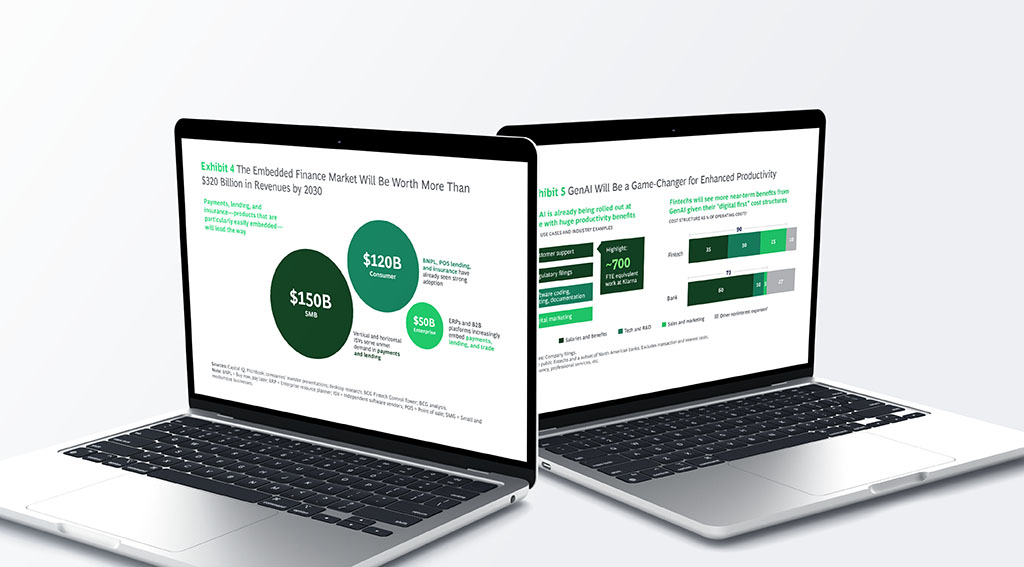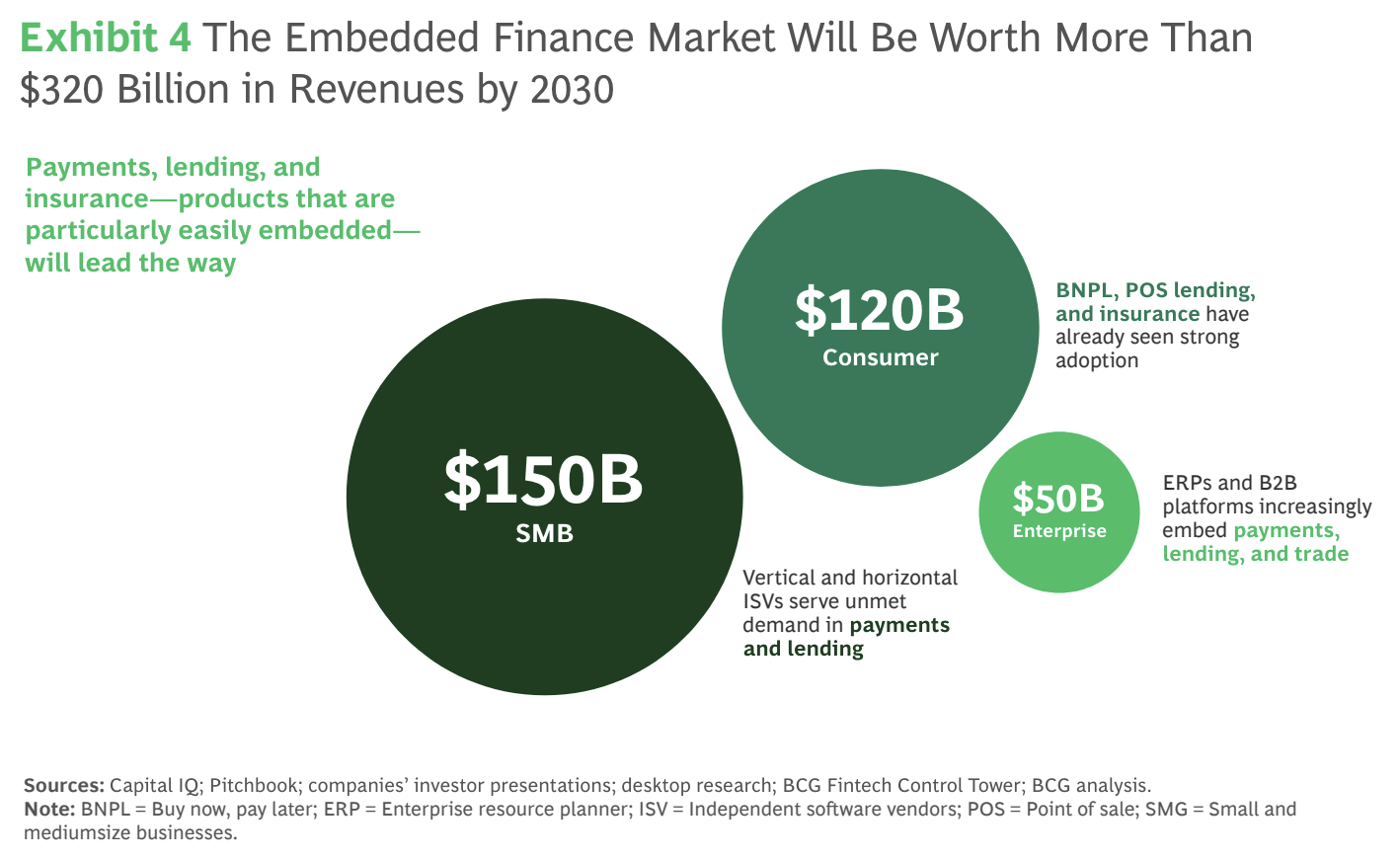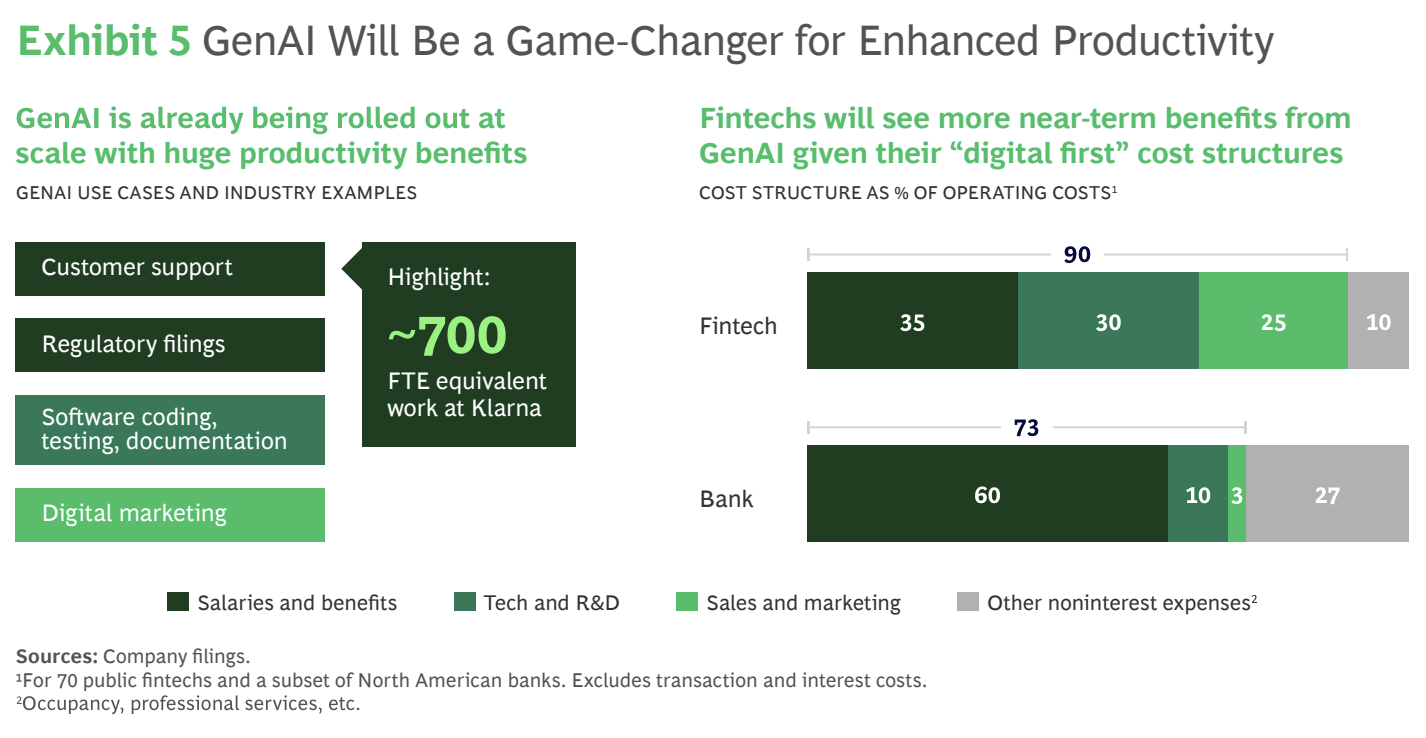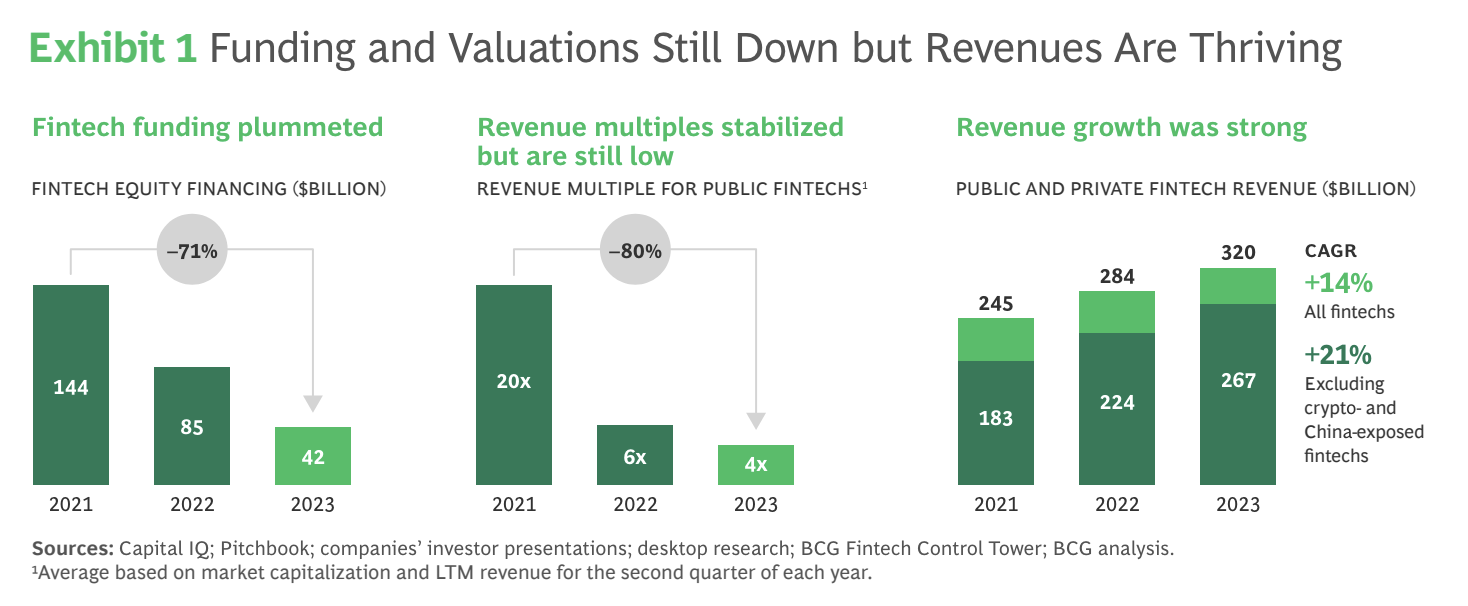Fintech
Global FinTech Revenues Expected to Reach $1.5 Trillion by 2030 – Fintech Schweiz Digital Finance News

Free Newsletter
Get the latest Swiss Fintech news once a month in your inbox
Recent advances in technologies such as generative artificial intelligence (AI), coupled with the large number of people around the world who are unbanked or underbanked, offer significant opportunities for the global fintech sector.
According to a new report from Boston Consulting Group and QED Investors, the industry is expected to reach $1.5 trillion in revenue by 2030, five times the current market size.
The report, titled “Global Fintech 2024: Prudence, Profits, and Growth,” provides an overview of the evolution of the sector, drawing on insights from industry leaders and investors. It discusses future developments in fintech, mentioning the potential of technologies such as genAI, and outlines trends shaping the sector, including embedded finance, open banking, and connected commerce.
Embedded Finance Will Become Pervasive by 2030
The first major theme highlighted in the report is the rise of embedded finance, where financial services are integrated into non-financial interactions to eliminate friction and enable highly personalized customer experiences.
Initially, embedded finance use cases focused primarily on payments, lending, and insurance in both business-to-business (B2B) and business-to-consumer (B2C) contexts, but key players including Stripe and Adyen are expanding these use cases into areas such as bank-based payments, cryptocurrency payments, and digital assets. These two leading embedded finance companies have surpassed the trillion-dollar mark in total payments volume in 2023, showing substantial growth in embedded payments.
Embedded lending has also seen robust growth, with buy now, pay later (BNPL) leaders Klarna and Affirm processing significant transaction volumes of $90 billion and $20 billion, respectively. Embedded insurance has similarly shown rapid expansion, with premiums reaching approximately $8 billion in Europe last year.
Looking ahead, the global embedded finance market is expected to surpass $320 billion in revenue by 2030, with the small and medium-sized business (SMB) segment accounting for nearly half ($150 billion) of that sum. This growth will be driven by increased adoption of vertical and horizontal software solutions that meet the payments and lending needs of SMBs.
The consumer segment is also expected to contribute substantially to the rise of integrated finance, which is expected to reach $120 billion in revenue by 2030, with increasing adoption of BNPL, point-of-sale (POS) lending and integrated insurance.
Finally, the corporate vertical is expected to account for $50 billion in embedded financial revenue. This growth will be driven by the integration of payment, lending, and commerce capabilities into horizontal software solutions, aimed at addressing pain points in accounts payable and accounts receivable.
 Embedded finance market to be worth more than $320 billion in revenues by 2030, Source: Global Fintech 2024: Prudence, Profits, and Growth, Boston Consulting Group and QED Investors, June 2024
Embedded finance market to be worth more than $320 billion in revenues by 2030, Source: Global Fintech 2024: Prudence, Profits, and Growth, Boston Consulting Group and QED Investors, June 2024
Connected commerce ready to take off
Connected commerce, which refers to the integration of online and offline shopping experiences into a unified and seamless customer journey, represents a major opportunity for traditional banks to capitalize on their customer data. The approach enables new revenue streams and increased customer loyalty through personalized marketing. It also allows incumbents to serve as a platform for SMBs and enterprises.
Major banks and some fintechs are already investing in connected commerce. Examples include ventures like JPMorgan’s Chase Media Solutions, Capital One Shopping, and Citi Shop. Some fintechs, including Klarna, are also entering the connected commerce space, while others like Revolut and PayPal are launching advertising businesses.
Connected commerce adoption is expected to increase, emerging as a key application for incumbent banking players. As core revenue streams continue to come under pressure and deposits risk becoming commoditized in a high-yield environment, connected commerce offers a promising future model for traditional financial institutions.
Open banking will continue to expand
Open banking will continue to expand as more countries implement authorized customer access to their financial data, enabled by application programming interfaces (APIs). To date, over 65 countries have established open banking, with more expected to follow suit.
However, the report notes that while open banking will drive innovation and increase financial access, it is unlikely to change the basis of competition in the banking sector. Indeed, in countries where open banking has had a decade or more to mature, no killer use cases have emerged and the impact has been modest.
In the UK, open banking has been live for six years and yet consumer adoption has plateaued at 12% of monthly active users. In the Nordics, a region that has traditionally led the way in digital adoption, open banking user penetration is well below 50%, sitting at around 30% in Sweden and 25% in Norway.
According to the report, open banking will continue to be relevant in the future, but will not revolutionize financial services and fintech for consumers and SMEs.
GenAI emerges as a game changer
Finally, genAI is already proving its value in the financial services space, delivering tangible productivity gains in customer service and support, software coding, testing and documentation, regulatory compliance, and targeted, automated digital marketing.
Looking ahead, the applications and impact of genAI will only grow. In terms of cost of goods sold (COGS), genAI will increase productivity for development and service operations. In sales and marketing, the technology will increase output velocity for content creation and improve sales force effectiveness. And in general administrative expenses, it will optimize third-party spend, simplify the technology stack, and automate support functions.
GenAI is expected to have a much greater impact on fintechs than traditional banks in the near future. This is because fintechs have “digital first” cost structures that are heavily weighted toward areas where genAI is generating huge gains, such as coding, customer support, and digital marketing.
 GenAI will be a game changer for greater productivity, Source: Global Fintech 2024: Prudence, Profits, and Growth, Boston Consulting Group and QED Investors, June 2024
GenAI will be a game changer for greater productivity, Source: Global Fintech 2024: Prudence, Profits, and Growth, Boston Consulting Group and QED Investors, June 2024
Fintech Revenues Rise Despite Decline in Funding
Global fintech funding declined significantly in 2023, falling 71% from an all-time high of $144 billion in 2021 to $42 billion. Despite funding challenges, global fintech revenues continued to grow at a healthy pace, increasing 14% annually over the past two years to reach $320 billion in 2023, according to the report.
 Global Fintech Funding and Revenue, Source: Global Fintech 2024: Prudence, Profits, and Growth, Boston Consulting Group and QED Investors, June 2024
Global Fintech Funding and Revenue, Source: Global Fintech 2024: Prudence, Profits, and Growth, Boston Consulting Group and QED Investors, June 2024
In particular, challenger banks have performed excellently in 2023. Brazil’s Nubank, for example, got through the milestone of 100 million users in May 2024 and achieved record financial results in 2023 with over $1 billion in net income and over $8 billion in revenue. In Europe, Monzo reached up operating profitability in the first half of 2023 and has received GBP 340 million (US$430 million) in additional financing to fuel its global growth plans. In the U.S., Chime achieved profitability in the first quarter of 2024 and is now preparing for a possible initial public offering in 2025, Bloomberg reported in March.
Featured image credit: edited by free
Get the latest Swiss Fintech news once a month in your inbox
Fintech
US Agencies Request Information on Bank-Fintech Dealings

Federal banking regulators have issued a statement reminding banks of the potential risks associated with third-party arrangements to provide bank deposit products and services.
The agencies support responsible innovation and banks that engage in these arrangements in a safe and fair manner and in compliance with applicable law. While these arrangements may offer benefits, supervisory experience has identified a number of safety and soundness, compliance, and consumer concerns with the management of these arrangements. The statement details potential risks and provides examples of effective risk management practices for these arrangements. Additionally, the statement reminds banks of existing legal requirements, guidance, and related resources and provides insights that the agencies have gained through their oversight. The statement does not establish new supervisory expectations.
Separately, the agencies requested additional information on a broad range of arrangements between banks and fintechs, including for deposit, payment, and lending products and services. The agencies are seeking input on the nature and implications of arrangements between banks and fintechs and effective risk management practices.
The agencies are considering whether to take additional steps to ensure that banks effectively manage the risks associated with these different types of arrangements.
SUBSCRIBE TO THE NEWSLETTER
And get exclusive articles on the stock markets
Fintech
What changes in financial regulation have impacted the development of financial technology?

Exploring the complex landscape of global financial regulation, we gather insights from leading fintech leaders, including CEOs and finance experts. From the game-changing impact of PSD2 to the significant role of GDPR in data security, explore the four key regulatory changes that have reshaped fintech development, answering the question: “What changes in financial regulation have impacted fintech development?”
- PSD2 revolutionizes access to financial technology
- GDPR Improves Fintech Data Privacy
- Regulatory Sandboxes Drive Fintech Innovation
- GDPR Impacts Fintech Data Security
PSD2 revolutionizes access to financial technology
When it comes to regulatory impact on fintech development, nothing comes close to PSD2. This EU regulation has created a new level playing field for market players of all sizes, from fintech startups to established banks. It has had a ripple effect on other markets around the world, inspiring similar regulatory frameworks and driving global innovation in fintech.
The Payment Services Directive (PSD2), the EU law in force since 2018, has revolutionized the fintech industry by requiring banks to provide third-party payment providers (TPPs) with access to payment services and customer account information via open APIs. This has democratized access to financial data, fostering the development of personalized financial instruments and seamless payment solutions. Advanced security measures such as Strong Customer Authentication (SCA) have increased consumer trust, pushing both fintech companies and traditional banks to innovate and collaborate more effectively, resulting in a dynamic and consumer-friendly financial ecosystem.
The impact of PSD2 has extended beyond the EU, inspiring similar regulations around the world. Countries such as the UK, Australia and Canada have launched their own open banking initiatives, spurred by the benefits seen in the EU. PSD2 has highlighted the benefits of open banking, also prompting US financial institutions and fintech companies to explore similar initiatives voluntarily.
This has led to a global wave of fintech innovation, with financial institutions and fintech companies offering more integrated, personalized and secure services. The EU’s leadership in open banking through PSD2 has set a global standard, promoting regulatory harmonization and fostering an interconnected and innovative global financial ecosystem.
Looking ahead, the EU’s PSD3 proposals and Financial Data Access (FIDA) regulations promise to further advance open banking. PSD3 aims to refine and build on PSD2, with a focus on improving transaction security, fraud prevention, and integration between banks and TPPs. FIDA will expand data sharing beyond payment accounts to include areas such as insurance and investments, paving the way for more comprehensive financial products and services.
These developments are set to further enhance connectivity, efficiency and innovation in financial services, cementing open banking as a key component of the global financial infrastructure.
General Manager, Technology and Product Consultant Fintech, Insurtech, Miquido
GDPR Improves Fintech Data Privacy
Privacy and data protection have been taken to another level by the General Data Protection Regulation (GDPR), forcing fintech companies to tighten their data management. In compliance with the GDPR, organizations must ensure that personal data is processed fairly, transparently, and securely.
This has led to increased innovation in fintech towards technologies such as encryption and anonymization for data protection. GDPR was described as a top priority in the data protection strategies of 92% of US-based companies surveyed by PwC.
Financial Expert, Sterlinx Global
Regulatory Sandboxes Drive Fintech Innovation
Since the UK’s Financial Conduct Authority (FCA) pioneered sandbox regulatory frameworks in 2016 to enable fintech startups to explore new products and services, similar frameworks have been introduced in other countries.
This has reduced the “crippling effect on innovation” caused by a “one size fits all” regulatory approach, which would also require machines to be built to complete regulatory compliance before any testing. Successful applications within sandboxes give regulators the confidence to move forward and address gaps in laws, regulations, or supervisory approaches. This has led to widespread adoption of new technologies and business models and helped channel private sector dynamism, while keeping consumers protected and imposing appropriate regulatory requirements.
Co-founder, UK Linkology
GDPR Impacts Fintech Data Security
A big change in financial regulations that has had a real impact on fintech is the 2018 EU General Data Protection Regulation (GDPR). I have seen how GDPR has pushed us to focus more on user privacy and data security.
GDPR means we have to handle personal data much more carefully. At Leverage, we have had to step up our game to meet these new rules. We have improved our data encryption and started doing regular security audits. It was a little tricky at first, but it has made our systems much more secure.
For example, we’ve added features that give users more control over their data, like simple consent tools and clear privacy notices. These changes have helped us comply with GDPR and made our customers feel more confident in how we handle their information.
I believe that GDPR has made fintech companies, including us at Leverage, more transparent and secure. It has helped build trust with our users, showing them that we take data protection seriously.
CEO & Co-Founder, Leverage Planning
Related Articles
Fintech
M2P Fintech About to Raise $80M

Application Programming Interface (API) Infrastructure Platform M2P Financial Technology has reached the final round to raise $80 million, at a valuation of $900 million.
Specifically, M2P Fintech, formerly known as Yap, is closing a new funding round involving new and existing investors, according to entrackr.com. The India-based company, which last raised funding two and a half years ago, previously secured $56 million in a round led by Insight Partners, earning a post-money valuation of $650 million.
A source indicated that M2P Fintech is ready to raise $80 million in this new funding round, led by a new investor. Existing backers, including Insight Partners, are also expected to participate. The new funding is expected to go toward enhancing the company’s technology infrastructure and driving growth in domestic and international markets.
What does M2P Fintech do?
M2P Fintech’s API platform enables businesses to provide branded financial services through partnerships with fintech companies while maintaining regulatory compliance. In addition to its operations in India, the company is active in Nepal, UAE, Australia, New Zealand, Philippines, Bahrain, Egypt, and many other countries.
Another source revealed that M2P Fintech’s valuation in this funding round is expected to be between USD 880 million and USD 900 million (post-money). The company has reportedly received a term sheet and the deal is expected to be publicly announced soon. The Tiger Global-backed company has acquired six companies to date, including Goals101, Syntizen, and BSG ITSOFT, to enhance its service offerings.
According to TheKredible, Beenext is the company’s largest shareholder with over 13% ownership, while the co-founders collectively own 34% of the company. Although M2P Fintech has yet to release its FY24 financials, it has reported a significant increase in operating revenue. However, this growth has also been accompanied by a substantial increase in losses.
Fintech
Scottish financial technology firm Aveni secures £11m to expand AI offering

By Gloria Methri
Today
- To come
- Aveni Assistance
- Aveni Detection
Artificial intelligence Financial Technology Aveni has announced one of the largest Series A investments in a Scottish company this year, amounting to £11 million. The investment is led by Puma Private Equity with participation from Par Equity, Lloyds Banking Group and Nationwide.
Aveni combines AI expertise with extensive financial services experience to create large language models (LLMs) and AI products designed specifically for the financial services industry. It is trusted by some of the UK’s leading financial services firms. It has seen significant business growth over the past two years through its conformity and productivity solutions, Aveni Detect and Aveni Assist.
This investment will enable Aveni to build on the success of its existing products, further consolidate its presence in the sector and introduce advanced technologies through FinLLM, a large-scale language model specifically for financial services.
FinLLM is being developed in partnership with new investors Lloyds Banking Group and Nationwide. It is a large, industry-aligned language model that aims to set the standard for transparent, responsible and ethical adoption of generative AI in UK financial services.
Following the investment, the team developing the FinLLM will be based at the Edinburgh Futures Institute, in a state-of-the-art facility.
Joseph Twigg, CEO of Aveniexplained, “The financial services industry doesn’t need AI models that can quote Shakespeare; it needs AI models that deliver transparency, trust, and most importantly, fairness. The way to achieve this is to develop small, highly tuned language models, trained on financial services data, and reviewed by financial services experts for specific financial services use cases. Generative AI is the most significant technological evolution of our generation, and we are in the early stages of adoption. This represents a significant opportunity for Aveni and our partners. The goal with FinLLM is to set a new standard for the controlled, responsible, and ethical adoption of generative AI, outperforming all other generic models in our select financial services use cases.”
Previous Article
Network International and Biz2X Sign Partnership for SME Financing
IBSi Daily News Analysis

SMBs Leverage Cloud to Gain Competitive Advantage, Study Shows
IBSi FinTech Magazine

- The Most Trusted FinTech Magazine Since 1991
- Digital monthly issue
- Over 60 pages of research, analysis, interviews, opinions and rankings
- Global coverage
subscribe now
-

 DeFi12 months ago
DeFi12 months agoDeFi Technologies Appoints Andrew Forson to Board of Directors
-

 Fintech12 months ago
Fintech12 months agoUS Agencies Request Information on Bank-Fintech Dealings
-

 News1 year ago
News1 year agoBlock Investors Need More to Assess Crypto Unit’s Earnings Potential, Analysts Say — TradingView News
-

 DeFi12 months ago
DeFi12 months agoSwitchboard Revolutionizes DeFi with New Oracle Aggregator
-

 DeFi12 months ago
DeFi12 months agoIs Zypto Wallet a Reliable Choice for DeFi Users?
-

 News1 year ago
News1 year agoBitcoin and Technology Correlation Collapses Due to Excess Supply
-

 Fintech12 months ago
Fintech12 months agoWhat changes in financial regulation have impacted the development of financial technology?
-

 Fintech12 months ago
Fintech12 months agoScottish financial technology firm Aveni secures £11m to expand AI offering
-

 Fintech12 months ago
Fintech12 months agoScottish financial technology firm Aveni raises £11m to develop custom AI model for financial services
-

 News1 year ago
News1 year agoValueZone launches new tools to maximize earnings during the ongoing crypto summer
-

 Videos6 months ago
Videos6 months ago“Artificial intelligence is bringing us to a future that we may not survive” – Sco to Whitney Webb’s Waorting!
-

 DeFi1 year ago
DeFi1 year agoTON Network Surpasses $200M TVL, Boosted by Open League and DeFi Growth ⋆ ZyCrypto






